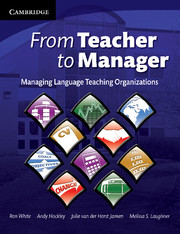Book contents
- Frontmatter
- Contents
- Thanks & acknowledgements
- Introduction
- 1 Managing in the LTO
- 2 Organizational behaviour and management
- 3 Human resource management
- 4 Marketing and sales
- 5 Customer service
- 6 Strategic financial management
- 7 Operational financial management
- 8 Academic management
- 9 Managing change
- 10 Project management
- Appendix
- References & further reading
- Index
5 - Customer service
Published online by Cambridge University Press: 14 February 2023
- Frontmatter
- Contents
- Thanks & acknowledgements
- Introduction
- 1 Managing in the LTO
- 2 Organizational behaviour and management
- 3 Human resource management
- 4 Marketing and sales
- 5 Customer service
- 6 Strategic financial management
- 7 Operational financial management
- 8 Academic management
- 9 Managing change
- 10 Project management
- Appendix
- References & further reading
- Index
Summary
INTRODUCTION
This chapter deals with the other side of the coin introduced in Chapter 4. The focus here moves to customers once they have purchased and are using the LTO’s services. Although in their professional training teachers are not encouraged to consider themselves as service providers, once they enter the world of the LTO they will find that it is the quality of the service – and particularly the service that they provide in the classroom – which influences customers’ satisfaction and which helps to differentiate one LTO from another. Far from deprecating the importance of service, we consider it to be essential for all staff to be aware of their responsibilities as service providers, and to take pride in providing a quality service. Understanding what it is that their clientele wants is, of course, fundamental. What, then, are the customers’ expectations of service?
BACKGROUND RESEARCH
The offshore market: New Zealand
Finding an answer to this question has been investigated by John Walker in New Zealand, where LTOs serve a predominantly offshore market, with a nationally diverse clientele. In a focus group-based study, Walker (2001) identified seven broad categories or major issues regarding customers’ expectations of TESOL service:
• the ESOL teacher
• English language school milieu
• homestay arrangements
• systems for obtaining client feedback on the service
• servicescape (the settings in which services are provided and where the provider and customer interact)
• effective communication with language school
• procedures for placement in appropriate class/level.
He also analysed the themes that emerged most frequently in four out of five of the focus groups, and he suggested that these could be termed key satisfaction drivers for the participants in the study, which are most likely to influence a customer’s decision to recommend a particular LTO (which, in turn, is considered to be a key indicator of customer loyalty in the Net Promoter Score, discussed on p. 133).
• The English language school must be a friendly, comfortable and relaxed place.
• The ESOL teacher should be available to see clients individually outside the classroom.
• The LTO should have effective client feedback systems in place.
- Type
- Chapter
- Information
- From Teacher to ManagerManaging Language Teaching Organizations, pp. 113 - 150Publisher: Cambridge University PressPrint publication year: 2008

